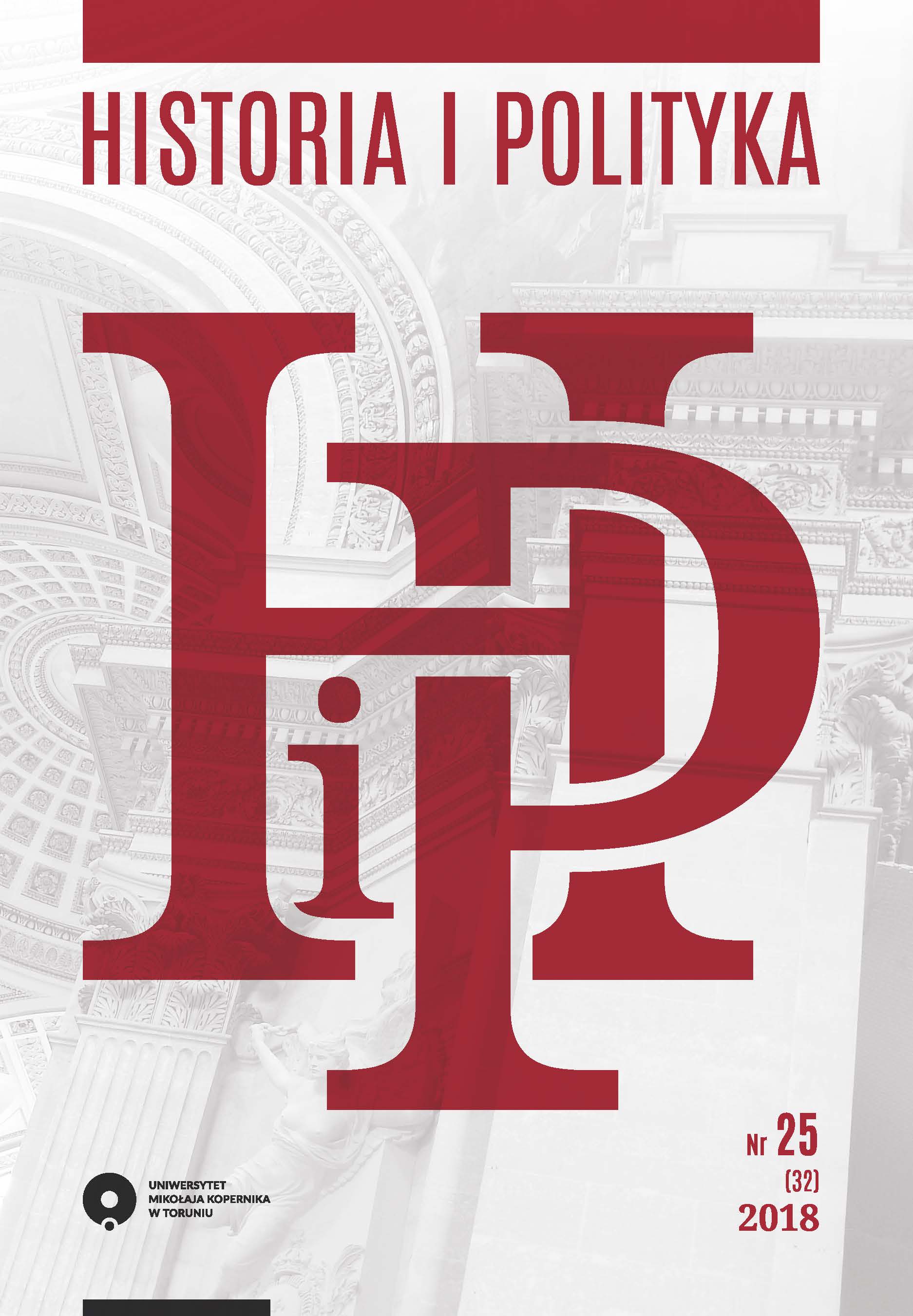Militaryzm – ujęcie teoretyczne
DOI:
https://doi.org/10.12775/HiP.2018.021Słowa kluczowe
militaryzm, ideologia, wyścig zbrojeńAbstrakt
While an increasing number of researchers develop an interest in security studies, the problem of militarism is systematically overlooked in scientific publications. In the Polish discourse, this phenomenon is most often identified with ideology or the military build-ups. However, these are not the only existing theoretical approaches of the militarism phenomenon. This article aims to fill a certain gap in theoretical considerations on this subject and to present the most important theoretical perspectives of militarism and also its typology. The main research problem is to find an answer to the question: how is militarism understood today?Bibliografia
Bäcker, R. (2010). Autorytaryzm. Historia i Polityka, 2/3 (s. 21–25). DOI: http://dx.doi.org/10.12775/HiP.2010.002.
Burak, B. (2011). The Anatomy of Militarism and an Overview of Civil-Military Relations. Pobrane z: https://thegwpost.com/2011/10/20/the-anatomy-of-militarism-and-an-overview-of-civil-military-relations/.
Chalmers, J. (2004). The Sorrows of Empire: Militarism, Secrecy, and the End of the Republic. New York: Metropolitan Books.
Heidelberg Institute for International Conflict Research. (2016). Conflict Barometer. Heidelberg: HIIK.
Klare, M. (1978). Militarism: The Issues Today. Bulletin of Peace Proposals, 9(2), 121–128.
Mabee, B., Vucetic, S. (2017). Varieties of Militarism: Towards a Typology. Pobrane z: osf.io/preprints/socarxiv/ezdqr.
Mann, M. (1996). Authoritarian and Liberal Militarism: A Contribution from Comparative and Historical Sociology. W: S. Smith, K. Booth, M. Zalewski (red.), International Theory: Positivism and Beyond (s. 221–239). Cambridge: Cambridge University Press.
Mann, M. (2003). Incoherent Empire. London: Verso.
Mutschler, M.M. (2017). Global Militarization Index 2017. Bonn: Bonn International Center for Conversion.
Olszanecka, N. (2018). Armia jako grupa interesu, problem stosunków cywilno-wojskowych. Athenaeum. Polskie Studia Politologiczne, 57, 170–181. DOI: 10.15804/athena.2018.57.10.
Shaw, M. (2011). Twenty-First Century Militarism: A Historical-Sociological Framework. Pobrane z: https://historicalsociology.files.wordpress.com/2011/08/shaw-twenty-first-century-militarism-a-historical-sociological-framework.pdf.
SIPRI. (2016). Military Expenditure by Region in Constant US Dollars, 1988–1996. Pobrane z: https://www.sipri.org/sites/default/files/Milex-regional-totals.pdf.
Skopin, W. (1959). Militaryzm. Warszawa: Wyd. MON.
Stavrianakis, A., Selby, J. (red.). (2013). Militarism and International Relations: Political Economy, Security and Theory. London: Routledge.
Tanter, R. (1991). Intelligence Agencies and Third World Militarization: A Case Study of Indonesia, 1966–1989, with Special Reference to South Korea, 1961–1989. Pobrane z: http://nautilus.org/wp-content/uploads/2011/12/Revised-opening-3.pdf.
Vagts, A. (1937). A History of Militarism: Romance and Reality of a Profession. New York: W.W. Norton & Co.
Wittner, L. (2016). Militarism Run Amok: Russians and Americans Get Their Kids Ready for War. Pobrane z: https://www.huffingtonpost.com/lawrence-wittner/militarism-run-amok-russians-and-americans-get-their-kids-ready-for-war_b_8062364.html.
Pobrania
Opublikowane
Jak cytować
Numer
Dział
Licencja
Uniwersytet Mikołaja Kopernika w Toruniu respektuje prawo do prywatności i ochrony danych osobowych autorów.
Dane autorów nie są wykorzystywane w celach handlowych i marketingowych. Redaktorzy i recenzenci są zobowiązani do zachowania w poufności wszelkich informacji związanych ze złożonymi do redakcji tekstami.
Autor, zgłaszając swój tekst wyraża zgodę na wszystkie warunki i zapisy umowy licencyjnej (określającej prawa autorskie) z Uniwersytetem Mikołaja Kopernika w Toruniu.
Statystyki
Liczba wyświetleń i pobrań: 505
Liczba cytowań: 0



